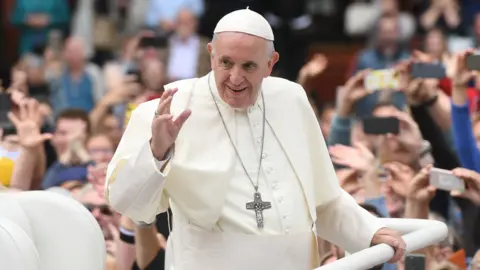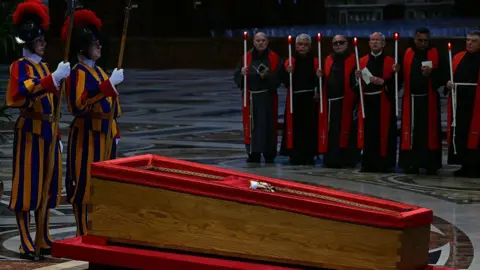Rome says farewell to the 'people's Pope'
 PA Media
PA MediaThe global media attention given to the death of Pope Francis and his funeral, which takes place today at St Peter's Basilica, and the obvious affection felt for him by millions of people around the world, will come as no surprise to anyone who watched his 12-year pontificate unfold.
Partly it's because it has been so long - 20 years - since a pope has died in office.
Benedict retired as Pope in February 2013 and his death nine years later, on 31 December 2022, was overtaken by the new year festivities.
Not since the death of John Paul II, six days after Easter in 2005, have we seen the traditions and rituals of a church mourning its reigning Pope.
 Getty Images
Getty ImagesBut that alone does not explain the reaction of the public. His personality, more than anything else, endeared him to millions of people around the world.
His humility, sense of humour, approachableness, non-judgmental spirit; his willingness to engage in a conversation with the world rather than offer entitled proclamations; and his unpredictability, the sense we all had that he was unscripted and comfortable in his own skin - these were the aspects of Francis's personality that led some to describe him as "the people's Pope".
In fact, many of the traits that could frustrate more conservative Catholics are what earned him a hearing from those outside his Church, those who struggle with faith, and those who have been hurt by religion in one form or another.
One pilgrim in St Peter's Square told me she "loved" the Pope not because he was Pope but because he didn't seem like a Pope. He seemed like a simple pastor," she said, "a wise friend, an older mentor, who walked alongside me".
Just opposite the church where Pope Francis will be buried after today's papal funeral, a large banner hangs from a building bearing a hand-painted slogan: "GRAZIE, FRANCESCO".
The simple choice of words is telling: "Thank you, Francis". Not "Your Holiness" or even "Holy Father". Just "Francis".
